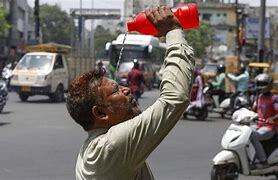I recently read an article on the life of a Pakistani laborer who was trying to feed his family by working 12 hours a day in scorching temperatures. There are numerous articles of entire populations being threatened by rising temperatures in the developing world. Pakistan, a country of 241 million people, is already threatened by political and economic turmoil due to rising average global temperatures.
Recently in New Delhi, temperatures have approached 122 degrees Fahrenheit which is getting close to the limits of human survival.
Americans have no idea what it is like to live in the hot season in Pakistan or northern India. I lived for a few weeks in the hot season (May and June before the monsoon rains) in West Bengal, India in the 1990’s. The temperature reached 115 degrees Fahrenheit some days in a humid climate. The cement and brick house heated up in the sun all day long and the heat radiated into the interior all during the night.
I was forced to flee to a hill station in the Himalayas but most Indians did not have the luxury to leave their families and jobs and become climate refugees to avoid the heat by moving to cooler places.
Life in that heat was beyond miserable, and I and my wife were not even required to work. It was literally torture for someone who did not grow up there. We just laid on the bed trying to breathe as the fan often stopped working due to load shedding (a temporary controlled loss of electricity). Loss of power is a common occurrence in less developed areas of the world that makes the heat that much worse.
But we in the West often treat denial of carbon pollution from cars and power plants as if it were a game and as an identifier to define our political identity.
Conservatives don’t like change and therefore must be against moving away from fossil fuel burning and towards a carbon neutral economy. It is an aesthetic and personal political choice that they often treat lightly and sometimes thoroughly enjoy by being a doubter of claims made by scientists and the unloved and resented educated elite.
But to hundreds of millions in South Asia, raising the average global temperature a few more degrees is a recipe for extended torture and cultural dysfunction. Raising it a few more degrees beyond that can literally become a mass death sentence.
Of course, there is plenty of denial around the claims of global warming and the denial of scientific evidence has become a satisfying hobby for many. Cigarette companies denied smoking causes cancer for decades and oil companies are using the same very successful playbook to deny the negative effects of burning fossil fuels.
But those who consider their denial of global warming to be an abstract choice need to experience the effects of their choices on a billion or more other people in the developing world.
Let them visit northern India in the hot season (May/June) and see how abstract, unimportant, or entertaining their choices are.
The West’s addiction to fossil fuels may be slowly cooking a significant portion of the human race because of a population with characteristic pride and denial that does not want change. The very profitable oil extraction and refining businesses finance such denial but few want to consider that uncomfortable fact.
My approach: If there is even a 10% chance that global warming is real and can be stopped, the doubters might consider making a change. They can inconvenience themselves and make an effort to reduce their consumption of fossil fuels by converting to solar or wind power and/or driving electric vehicles.
Of course the chances that the planet is heating up due to use of fossil fuels is way above 10% but even a small probability is enough to make deniers pay attention and reconsider their choices.
Deniers who listen to reason will potentially be saving millions of their fellow humans from prolonged torture and even eventual death.
To the doubters: Take a chance. Make a change. The rewards for humanity as a whole will be incalculable.
Who knows? Being human, climate change skeptics might even gain some unforeseen advantage for themselves (apart from saving money on gas and electric bills and breathing better quality air).
Consider this an open invitation to save the planet and a significant number of the people who live on it.
